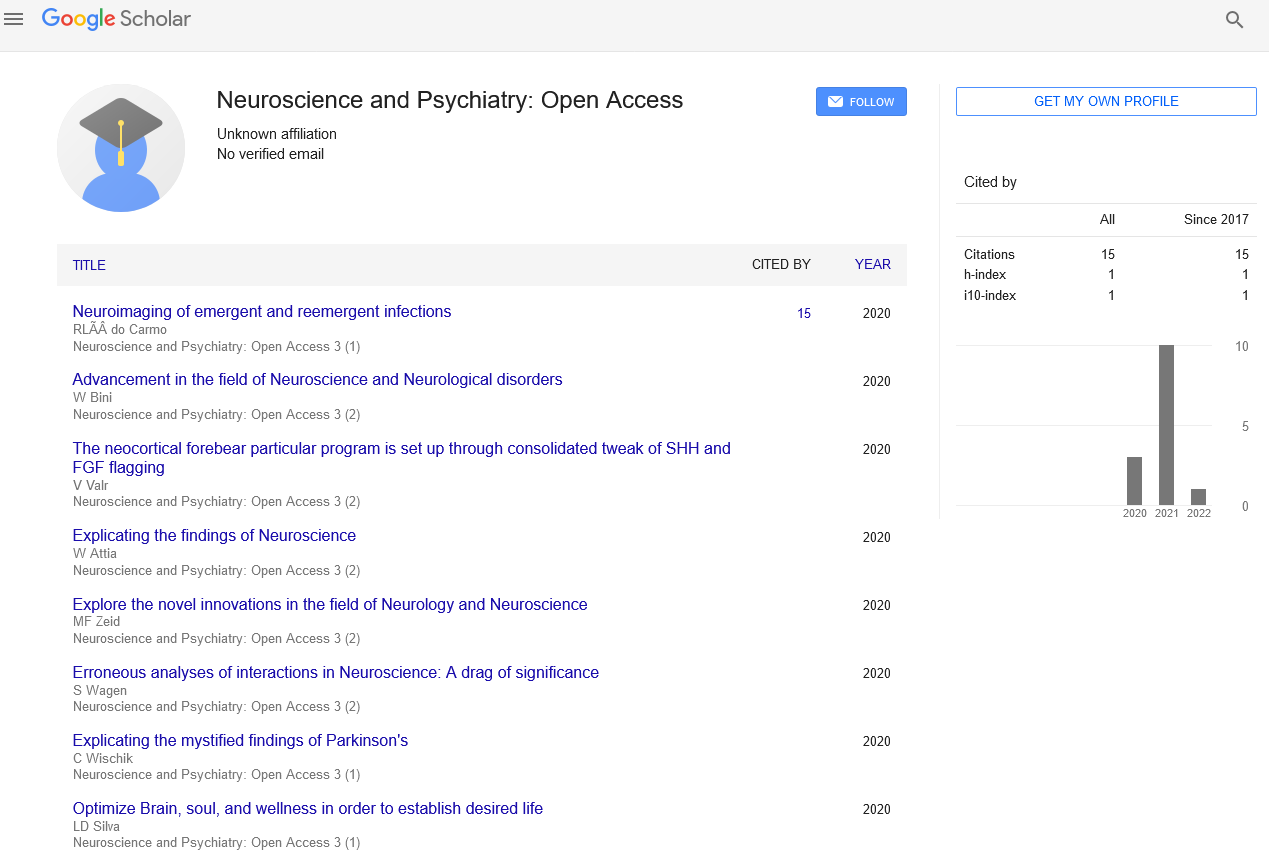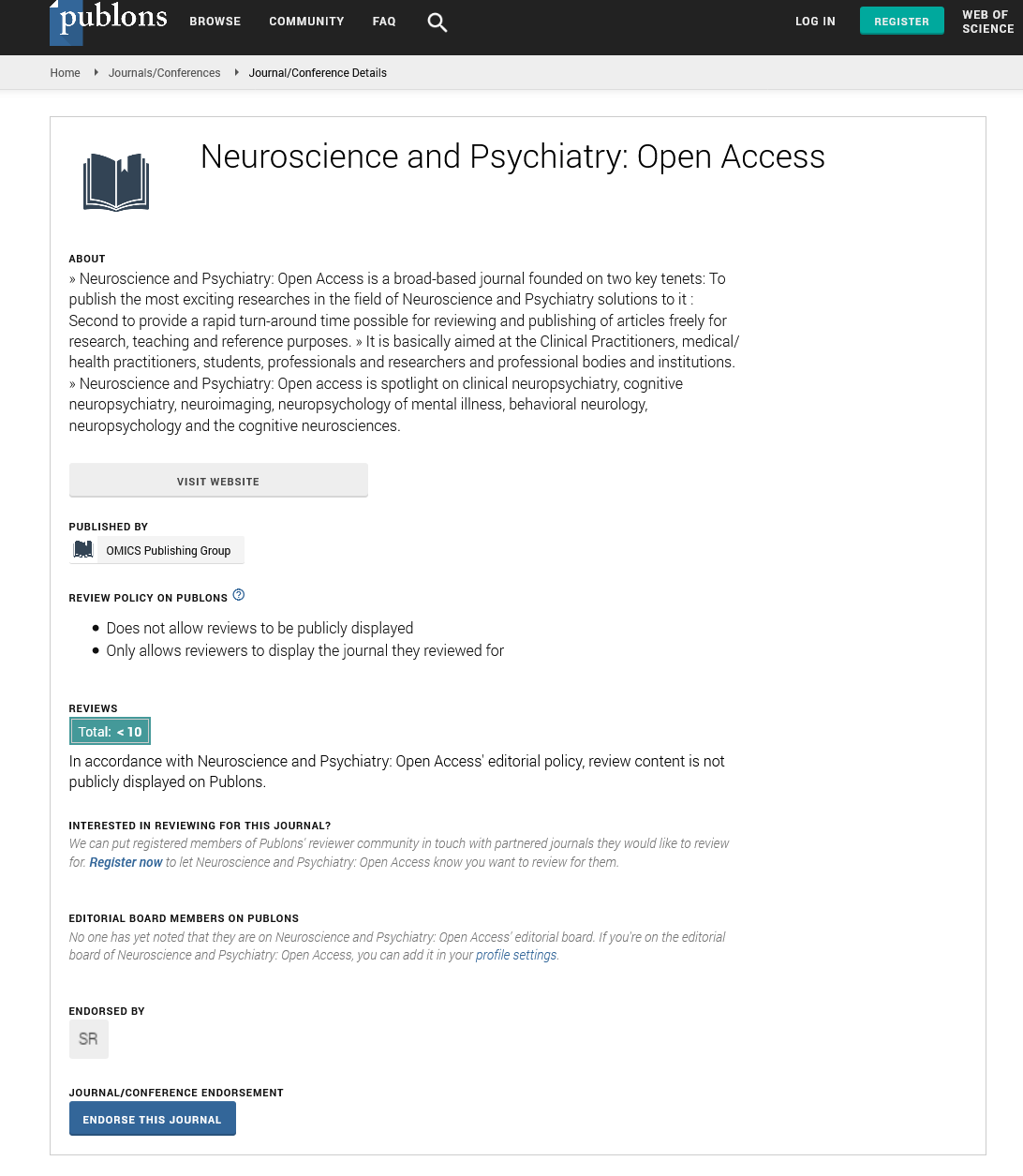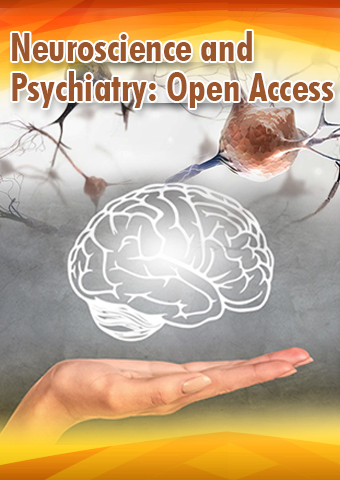Perspective - Neuroscience and Psychiatry: Open Access (2024) Volume 7, Issue 1
The Interplay of Psychiatry and the Brain: Exploring the Complex Relationship
- Corresponding Author:
- Michael Levin
Department of Psychiatry, University of California Irvine, Irvine, USA
E-mail: michael.le7@tufts.edu
Received: 03-01-2024, Manuscript No. NPOA-23-119208; Editor assigned: 06-01-2024, PreQC No. NPOA-23-119208 (PQ); Reviewed: 20-01-2024, QC No. NPOA-23-119208; Revised: 31-01-2024, Manuscript No. NPOA-23-119208 (R); Published: 08-02-2024, DOI: 10.47532/npoa.2024.7(1).168-169
Introduction
Psychiatry, as a medical specialty, delves into the intricacies of the human mind, while the brain serves as the central command center of our thoughts, emotions, and behaviors. The relationship between psychiatry and the brain is at the heart of understanding and treating mental health disorders. In this article, we will embark on a journey to explore the interplay between psychiatry and the brain, examining the biological underpinnings of psychiatric conditions, the advances in brain research, and the transformative impact of psychiatry on the lives of individuals facing mental health challenges.
The brain is a marvel of biological engineering, comprising approximately 86 billion neurons connected by trillions of synapses. It is responsible for our cognitive functions, emotional responses, and regulatory control over our bodies. Understanding the brain’s structure and function is integral to psychiatry, as it provides insights into the biological basis of mental health and psychiatric disorders.
Description
Psychiatry and the biological basis of mental health
Psychiatry has evolved significantly in understanding the biological basis of mental health and mental illness. Research in this field has yielded key insights into the brain’s role in psychiatric conditions:
Neurotransmitters: Research has demonstrated that imbalances in neurotransmitters can contribute to mood disorders like depression and bipolar disorder. Medications targeting these imbalances, such as Selective Serotonin Reuptake Inhibitors (SSRIs), have been instrumental in managing these conditions.
Brain imaging: Advances in brain imaging techniques, such as Magnetic Resonance Imaging (MRI) and Positron Emission Tomography (PET), have allowed psychiatrists to visualize structural and functional brain changes in individuals with mental health disorders. This has led to earlier diagnosis and more targeted treatments.
Genetic factors: Genetics play a significant role in many psychiatric conditions. Understanding the genetic underpinnings of mental health has led to the identification of risk factors, and in some cases, the development of precision medicine approaches.
Neuroinflammation: Emerging research suggests a link between neuroinflammation and psychiatric disorders, particularly in conditions like schizophrenia and major depressive disorder. This avenue of study may open new doors for treatment.
Psychiatry’s impact on mental health
Psychiatry plays a pivotal role in the realm of mental health by offering assessment, diagnosis, treatment, and support to individuals facing psychiatric disorders. Some key aspects of psychiatry’s impact on mental health include:
Assessment and diagnosis: Psychiatrists utilize a range of assessment tools, including interviews, questionnaires, and diagnostic criteria, to evaluate and diagnose psychiatric conditions accurately. This step is crucial for identifying the most appropriate treatment approaches.
Medication management: Psychiatrists can prescribe medications to manage psychiatric symptoms. These medications may include antidepressants, antipsychotics, mood stabilizers, and anxiolytics. Medication management is a cornerstone of treatment for many psychiatric disorders.
Psychotherapy: Psychotherapy, or talk therapy, is a fundamental aspect of psychiatric treatment. It encompasses various approaches, including Cognitive-Behavioral Therapy (CBT), psychoanalysis, and Dialectical Behavior Therapy (DBT), tailored to the specific needs of the individual.
Early intervention: Early intervention in psychiatric conditions, such as in the prodromal phase of schizophrenia or the early stages of mood disorders, is crucial for better outcomes. Psychiatry’s role in recognizing and addressing conditions early is invaluable.
Holistic care: Psychiatry is increasingly adopting a holistic approach to mental health, considering not only the biological aspects but also the psychological, social, and environmental factors that contribute to mental well-being.
Ethical considerations in psychiatry
As with any field of medicine, ethics are central to psychiatry. Ethical considerations in psychiatry include:
Informed consent: Psychiatrists must obtain informed consent from their patients, ensuring they understand the proposed treatments, potential risks, and alternatives. This ethical principle upholds the autonomy and rights of the patient.
Confidentiality: Patient confidentiality is of utmost importance in psychiatry. Psychiatrists must maintain the privacy and trust of their patients, with strict adherence to professional and legal standards.
Competency and capacity: Assessing a patient’s competency to make treatment decisions and their capacity to understand the consequences of those decisions is a complex ethical challenge, especially in cases of severe mental illness.
Dual relationships: Psychiatrists must navigate the complexities of dual relationships, which occur when they have multiple roles with a patient (e.g., as a treating psychiatrist and an expert witness). These situations require careful ethical consideration.
The future of psychiatry and the brain
The future of psychiatry and its relationship with the brain is filled with promise and potential:
Precision psychiatry: Advances in genetics and neuroscience are paving the way for precision psychiatry. Tailoring treatments to an individual’s unique genetic and neurobiological profile holds the potential for more effective and personalized care.
Targeted therapies: The increasing understanding of the biological basis of psychiatric disorders is leading to the development of targeted therapies that address specific neurochemical or neurocircuitry imbalances.
Early intervention: The integration of advanced brain imaging and genetic screening may enable early detection and intervention in psychiatric conditions, offering the prospect of preventing more severe manifestations.
Holistic mental health: Psychiatry is embracing a more holistic approach to mental health, considering the interplay of biological, psychological, and social factors. This approach seeks to address the root causes of mental distress and promote well-being.
Conclusion
The interplay between psychiatry and the brain represents a profound exploration of the biological basis of mental health and psychiatric disorders. Understanding the brain’s role in mental health conditions has allowed for more precise diagnosis, targeted treatments, and early interventions. Psychiatry’s ethical principles guide the profession in ensuring the rights and well-being of individuals facing mental health challenges.
As research in neuroscience and genetics advances, the future of psychiatry holds the promise of precision care, targeted therapies, early intervention, and a holistic approach to mental well-being. The relationship between psychiatry and the brain is a dynamic and evolving field, with the potential to transform the lives of those affected by mental health conditions.


